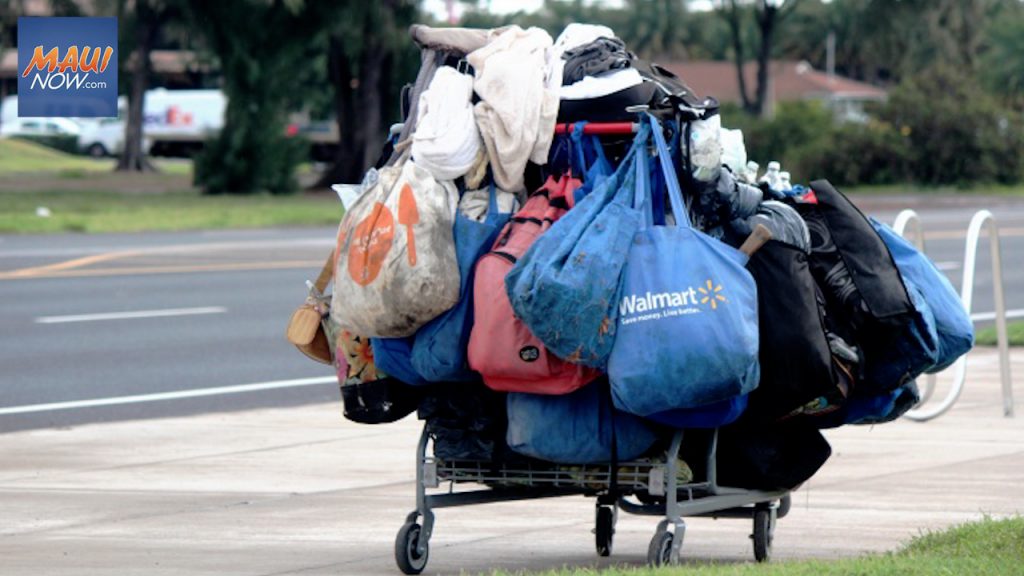‘Return-to-Home Program’ dies in conference committee at Legislature

A bill to establish a permanent “Return-to-Home program” failed to make it out of a House and Senate conference committee on Friday as members as the 2025 Legislature sprinted toward the finish of this year’s lawmaking session on Friday.
The amended House Bill 212 would have repealed the current pilot program, which has returned more than 100 homeless people back to their home states. The bill would have established a permanent program with funding for continued operations.
The Institute for Human Services on Oʻahu conducted the pilot program in a partnership with the state. A legislative finding in the bill called the program “a success,” although it needs additional manpower to continue.
The State Council on Mental Health submitted cautious written testimony on the bill, supporting the intent of the program but raising concerns about the possibility of further destabilizing already vulnerable people.
“While this initiative could be beneficial, its success depends on ensuring that participation remains entirely voluntary and that individuals receive adequate support at every stage — beginning with a warm handoff to their families and continuing with access to long-term treatment and recovery services in their respective destinations,” the Council said.
It put the measure in context with mental health services available in Hawaiʻi.
“Hawaiʻi’s mental health system is already operating beyond capacity,” the Council said. “The Big Island experiences an influx of individuals seeking services during the winter months, stretching providers’ ability to meet demand. Some of these individuals are experiencing their first diagnosis or initial mental health episode, and for them, assistance in returning home could be a critical intervention. However, we must recognize that family reunification alone does not guarantee sustained recovery. Many families face challenges in providing long-term care, and there is a need to assess how many reunions result in lasting stability versus repeated crises.”
The cost of full-time positions and operational costs for the Return-to-Home program remained undetermined in the draft bill, which left the amount of state appropriations blank for fiscal 2026 and 2027.
Under the permanent program, the statewide Office on Homelessness and Housing Solutions would have coordinated “Return-to-Home,” a voluntary homeless assistance program. It would provide homeless individuals with assistance in being reunited with family and relatives in their home state.
On behalf of the Institute for Human Services, Community Relations Manager Angie Knight supported the bill. The pilot program started with seed funds from the Hawaiʻi Tourism and Lodging Association, along with other funders to address the many transient homeless people encountered in Waikīkī. Under the bill, the program would become permanent and include one full-time position, “which is critical for the continued success and growth of this program,” she said.
“Over the years, we have seen an uptick in the number of out-of-state visitors in our outreach and shelter programs and this would save our state much more in benefit and healthcare dollars,” Knight said. “Currently, over 60% of new intakes at our men’s shelter are recent arrivals from out-of-state. Moreover, over the past year, we’ve seen an increase in demand for relocation services for individuals receiving care at behavioral health crisis centers and our own triage and treatment center, individuals voluntarily wishing to participate in in-patient programs in the Mainland. A partnership with Waikīkī community partners has also helped identify more candidates for this program more efficiently.”
Submitting written testimony on behalf of the Waikīkī Neighborhood Board, Jillian Anderson supported the Return-to-Home program, which already has sent 137 out-of-state individuals back to their families on the Mainland.
“The effects of this have been felt in Waikīkī, which is a common destination for our out-of-state homeless population,” Anderson said. “Providing permanency in staffing and funding will allow the return-to-home program to continue its effective efforts.”
The state homelessness office would have established a public-private partnership by contracting with eligible nonprofit/for-profit organizations or foundations to administer the program. The governor’s homelessness coordinator would have assisted with implementing the program.
To be eligible for the program, a homeless person would have needed to meet the following criteria:
- Participation is completely voluntary.
- If a person were on parole, probation or awaiting a court hearing or sentencing, he or she would need proper clearance from the court.
- Being indigent and lacking the financial resources necessary to return home.
- A person’s family or support group would need to be contacted to confirm their acceptance of him or her returning home.
- The person’s family or support group agrees to pay half the cost of transportation for the individual to return home to his or her state, although this requirement shall not apply if the person’s family or support group cannot cover half of the transportation costs.
Individuals may get paid to return to home one time only, under the bill.
The program would give people returning home assistance with necessary and proper preparations for travel, including obtaining proper identification, accessing public transportation to the airport, providing orientation to airport security and ensuring sufficient personal hygiene.
The program would actively seek the participation of local airlines, cruise lines, charter companies, homeless programs, travel agencies and the visitor industry for coordination and implementation.
House Rep. Mahina Poepoe of Molokaʻi is among more than a dozen introducers of House Bill 212.
Editor’s note: This post updates an earlier one that had noted House Bill 212 was pending in conference committee. However, it did not make it out of conference committee on Friday, although a bill status report did not state that explicitly.





_1768613517521.webp)







